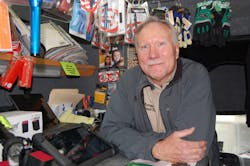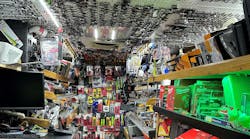Independent distributor Bob Fyler is technically retired; but you wouldn’t think that judging by his workload each day.
Fyler has been servicing the Glenn and Butte County areas, which includes Chico, Calif., since 2007. With a four-day route week that includes about 30 stops per day, he divides his time between automotive shops, agriculture and industrial operations such as logging and municipalities.
Traveling about 340 miles per week, Fyler sees about 500 customers and maintains 320 customers on the books.
Before selling tools, Fyler maintained a position as the vice president of merchandising for a Fortune 500 company.
Taking on nuts and bolts
About eight years ago, Fyler and his wife of 38 years, Karen, had the opportunity to take over Karen’s family-owned almond orchard in Butte County.
“I was traveling overseas working, and that’s just not conducive with the farm,” Fyler says of his previous VP position for a large company. “You can’t be gone for a month from the farm. Things happen.”
After retiring from his corporate position, Fyler looked to other opportunities to stay busy.
With a strong business background and a long-time interest in cars – specifically hot rods -- Fyler says he had a friend already running a mobile tool route, and thought having his own route would be a good option for retirement. “I’ll never be able to sit at home and watch TV or play golf; that’s just not how I’ll retire.”
Fyler started his route with a franchise in 2007. In July 2014, he decided to go independent and helped establish an independent distributor group called America’s Best Tools (see sidebar, page xx). Now, he spends his time divided between maintaining the farm when necessary, running his route full time and working with other independent distributors for America’s Best Tools.
Diversity in stops
While traditional mobile tool dealers primarily call on automotive aftermarket shops, Fyler makes sure to call on a mix of businesses.
“I don’t focus on automotive,” he says. “I focus on customers that need service and tools.”
Fyler divides his time between, what he calls, three different types of business: agriculture, industrial and automotive. Fyler finds that having this diversity allows his business to run smoothly, and provides steady sales throughout the year.
Agriculture shops have a busy season mostly between summer and early fall, and include any number of farms in the area, such as almond and walnut orchards, and rice fields.
“If you look at agriculture, we’re getting ready to go into our slow time, and we’ve had a really big summer,” says Fyler. As that business slows, he explains, “the loggers get out of the woods and the truck (facilities) start rebuilding their equipment. That tide rises up.”
Industrial stops refer to any municipalities, logging operations and heavy duty or bus facilities. The logging season picks up from late fall into winter.
Fyler’s third tier of business, automotive, includes a number of general automotive aftermarket shops, some dealerships, body shops and motorsports.
He says that there has been a downward trend with automotive repair facilities in the area – namely dealerships.
Of all his stops Fyler explains, “I learned right away that you’ve got to qualify the shop, and make sure they need your service. Just because they’re on your route doesn’t mean they need your service.”
Sometimes, Fyler will revise his route in order to stay efficient.
“I have non-productive stops. I try to reach them with promotions and things. At a certain point, you just have to tell them that you’ve added another stop that’s taken up your time, and you’re sorry, that you have to move on. I normally find another stop first.”
He has also established a working relationship with local vocational school Butte College, in Chico. Fyler is the only distributor to stop at this shop, and has worked regularly to sell tools used for training at the college, as well as to provide giveaways for students.
“He’s our guy,” says George Medina, program chair for Butte College. “Ever since we’ve had a relationship with Bob, he’s worked hard to give away toolboxes, and he’s treated us really, really well. We appreciate it.”
Meeting customer expectations
Fyler is a true professional. Every customer that Fyler does business with, he’s sure to shake his or her hand. He believes exceptional service – delivering the right tools and honoring warranties – can be provided only if he makes sure to stop at the same time, each week.
A standard for all America’s Best Tools distributors, Fyler has price tags on all items for sale on his truck.
“That’s part of our program,” says Fyler. “A guy said to me yesterday, ‘You know, I love coming on your truck because I don’t have to bother you the whole time asking ‘How much is this?’
While remaining professional, Fyler also says he doesn’t want to pressure his customers into unnecessary sales.
“There’s no high pressure. I don’t think that helps me, I don’t think it helps them. I don’t really want to deal that way,” he says. “I think they respect that.”
He also wants to ensure that he’s delivering the proper service.
“If you’re going to do $10,000 a week (in sales), you need to spend seven minutes per customer.”
He knows that some customers are more hands-off and like to browse the truck, while others will require Fyler to stand by for inquiries.
When Fyler has a new customer on his truck, he explains it’s important to train that customer on payments up front. He will start new customers with a smaller balance, having them pay down this amount before adding more sales. “You raise their payments as they buy more.”
Once he establishes this relationship, Fyler says he has built a loyal customer base.
“A lot of young guys are very happy to give you $100 a week,” says Fyler. “Just take good care of them, and keep selling to them, and they’ll just keep coming back.”
Basics of the operation
Fyler runs his route four days per week, reserving Friday as a service day for deliveries, orders and stocking inventory. His route days can last anywhere from 10 to 12 hours. “I’d rather work four long, hard days than five,” says Fyler.
While Karen spends most of her time running the family farm, she also helps with the business. She handles bookkeeping and taxes, obtaining licenses and handling any legal documents. She’ll also deliver items to customers if Fyler is unavailable.
Fyler drives a 2012 24’ Freightliner M2 truck, with an extra-wide box. This extra room allows Fyler to fully stock his truck from floor to ceiling.
“For a lot of guys, they might think my truck is overwhelming; too many tools. For your customer who needs something, and you have it in stock, they love you,” he says.
Fyler’s truck also features a corner desk, near the walk-through cab of the truck. He says this keeps him out of the way, so customers can browse.
When he remodeled his truck, he also included an area near the desk with a built-in refrigerator and candy display.
Inventory on the truck
While Fyler says he doesn’t spend much time switching up the layout of his truck, he does stress the importance of displaying products by category sections. This allows both him, and his customers, to easily find tools they’re looking for.
“When you’re going to look for a diagnostic device, it’s going to be on one of those two shelves,” Fyler says, pointing to an area of the truck. “And my guys know that.”
Because of Fyler’s diversity in different stops, he stocks a number of different products.
Recently, he’s been pushing an opacity testing device for his heavy duty shops, used to measure the amount of exhaust emitted from smoke stacks on larger trucks.
“You shouldn’t see smoke or exhaust in the state of California. California is stringent on everything,” he says.
For agriculture operations, he’s also sure to stock a number of grease guns and pullers.
“Farm equipment has a tremendous number of different sizes of bearings. An almond harvester might have 25 pairs of different bearings,” says Fyler. He and his wife can relate to this with customers because they also have to maintain farm equipment to keep their own nut farm operation running smoothly.
He finds that all of his customers have been on board with Fyler’s adoption of the SK brand: “Agriculture guys, logging guys, trucking guys – they love SK. They love the durability, the heartiness.”
Fyler also says that he does well with boot sales, selling Redback Boots.
“I just carry the slip-on. And I’ll carry one set of the lace up so they can see it.” He’ll keep almost every size slip-on available on the truck to try on, then order steel toe or lace up, based on the customer’s preference.
Challenges on the job
Fyler finds that the stringent regulations in California can be more challenging for his business. For instance, state regulations require a clean idle certification for trucks. According to Fyler, these alternative engine types are not conducive to idling for long periods of time. Because of this, he’s incorporated a diesel generator for idling.
“You have to keep the truck cool in the summertime for the customers. So I’ve got two engine-driven ACs, and one RV air conditioner that runs on the generator,” he says.
Of all of Fyler’s challenges, he says that meeting customer expectations is at the top. This means finding and stocking new products, and being fast to market with those products.
“The number one question – and this is an industry issue, not just my issue – the first thing you hear every day is ‘What’s new?’ Then, ‘What’s on promo?’”
In order to answer these customer questions, Fyler continually keeps tabs on new products to market.
“It can be hard to get excited about ratchets and wrenches,” says Fyler. “Your customer, they only get excited when they need one.” Because of this, he says of products that will pique a customer’s interest: “It has to be some item with a new and unique attribute or feature.”
To educate and display new and innovative products, Fyler will think of different ways to demonstrate those items on his truck. As an example, Fyler had ordered portable speaker sets, and only sold a few sets until he displayed the units on his truck.
He has begun to partner with different manufacturers to help.
“We have a demo program coming up with Ingersoll Rand, where they’re providing us with a large number of demo tools, and we can leave those behind with our customers and let them demo them for a week.”
Look to the future
For 2015, Fyler predicts he’ll have a strong year based on current trends. “I’ll do everything I can to protect that trend by creating unique opportunities. But, I’m just not going to wait for it to come. I think guys get in trouble waiting for business to come. You have to create demand.”
Fyler has no plans on retiring (again), just yet. He will continue with the establishment and growth of America’s Best Tools, while maintaining his current route.
“I think my business will remain strong. I think I’ve got embedded where it’s very predictable, and very steady. For a lot of guys, they’re riding a roller coaster.”


